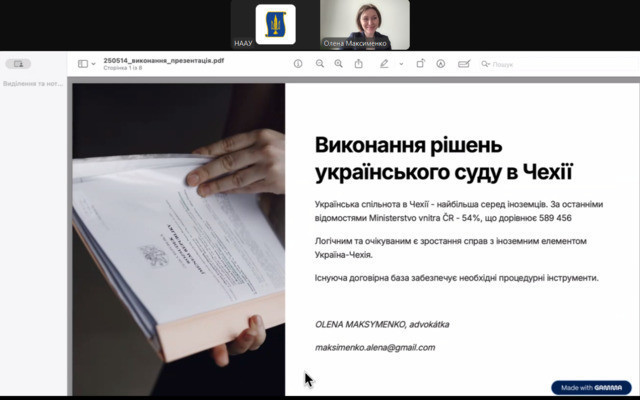
Court in the Czech Republic: how an advocate should prepare a Ukrainian decision for recognition

According to the Ministry of the Interior of the Czech Republic, Ukrainians have become the largest group of foreigners in this country. This has led to an increase in the number of civil, family, labor, and commercial disputes with a «Ukrainian element».
The procedure for recognizing Ukrainian court decisions in the Czech Republic was examined during a webinar held on May 19 by UNBA representative in this country Olena Maksymenko.
There is an agreement between Ukraine and the Czech Republic on legal assistance in civil matters, ratified by Law of Ukraine No. 2927-III.
The document covers a wide range of legal relations and establishes a mutual obligation to recognize and enforce court decisions in property and non-property matters, as well as decisions of arbitration courts.
The speaker explained in detail two options for initiating the process of recognition of a Ukrainian decision in the Czech Republic.
The first is through the Ministry of Justice of Ukraine. In this case, the application is submitted by the interested party, their advocate or legal representative. The package of documents must contain a copy of the decision, confirmation of its entry into force, proof of notification of the defendant about the consideration of the case, as well as an official translation of each document into Czech.
The second way is to submit it directly to the Czech court in the form of a statement «návrh na uznání cizího rozhodnutí». The statement must be detailed and comply with the language and formatting requirements. It can be submitted via electronic mailbox (datová schránka), but must be followed by a paper copy. The applicant may be either the interested party or an advocate registered with the Czech Bar Association.
O. Maksymenko drew particular attention to the typical grounds for refusal of recognition:
- the decision has not become final;
- lack of jurisdiction of the court;
- violation of the defendant's right of defense;
- existence of a valid decision of a Czech court on the same issue;
- the fact of prior recognition of the decision in the Czech Republic.
She also highlighted the differences inherent in certain categories of decisions. For example, decisions of arbitration courts are submitted directly to the court of a foreign state. Decisions that do not require enforcement (e.g., divorce) do not require recognition—an official translation is sufficient. The procedure for enforcing decisions on the recovery of alimony is considered separately: in this case, the provisions of the international convention ratified by Ukraine on January 11, 2013, apply.
O. Maksymenko provided a number of practical tips for advocates handling cases with an international element. In particular, she recommends that, at the stage of preparing a decision in a Ukrainian court, the future prospects for its recognition abroad should be taken into account. To this end, it is necessary to ensure that the defendant is duly notified, that the procedural documents are carefully drawn up, and that the translation and confirmation of entry into force are prepared in advance. The speaker also emphasized the importance of choosing a Czech advocate listed in the official register of the Czech Bar Association (ČAK) when filing a case directly with a Czech court. High-quality translation and clear legal reasoning in the application are key factors influencing the speed and effectiveness of case proceedings, the speaker stressed.
Thus, the existence of a bilateral agreement between Ukraine and the Czech Republic provides a clear and predictable mechanism for legal work. At the same time, the outcome depends on the quality of the preparation of materials and the correct application of both Ukrainian and Czech legislation. «A decision recognized in the Czech Republic has the same legal force as a decision of a Czech court. Therefore, an advocate in this procedure performs not only a procedural but also a strategic role — defending the interests of the client in a complex transnational field of legal norms», - concluded O. Maksymenko.
© 2025 Unba.org.ua Всі права захищені
"Національна Асоціація Адвокатів України". Передрук та інше використання матеріалів, що розміщені на даному веб-сайті дозволяється за умови посилання на джерело. Інтернет-видання та засоби масової інформації можуть використовувати матеріали сайту, розміщувати відео з офіційного веб-сайту Національної Асоціації Адвокатів України на власних веб-сторінках, за умови гіперпосилання на офіційний веб-сайт Національної Асоціації Адвокатів України. Заборонено передрук та використання матеріалів, у яких міститься посилання на інші інтернет-видання та засоби масової інформації. Матеріали позначені міткою "Реклама", публікуються на правах реклами.